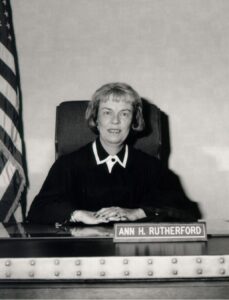by Kim Weir
guest commentary posted March 18
Retired Superior Court Judge Ann Rutherford, the first female judge in Butte County, served 40 years on the California bench. She died Feb. 16.
The people who Judge Ann Rutherford left behind are now sharing their verities about her. Groundbreaking, she was, and trailblazing. Remarkable. Highly regarded, sharp-minded, and quick-witted, too. She was all that.

But no words capture her depth of commitment to justice, or the fierceness of her intelligence and character. Anyone who mistook her decency and fairness for gullibility would regret it. She took no prisoners.
Once, an acquaintance of mine came before Judge Ann in a contentious divorce — one so nasty it led to criminal contempt charges against her ex-husband. His continuing harassment and defiance landed him in jail. Twice. The third time, Judge Ann told the bailiff to lock him up, with only a legal pad and pen, until he wrote his ex-wife a sincere letter of apology. And if, at the end of court that day, Judge Ann wasn’t happy with the letter’s content or tone, she would then send him to prison.
He wrote the letter. The harassment stopped.
* * * * *
The official story of Judge Ann Rutherford is impressive.
Judge Ann was Butte County’s first female judge, appointed by a new Governor Jerry Brown in 1976 to fill the open seat on the Chico Municipal Court. She was among his first judicial appointments. Starting with a nearly all-white, all-male California bench — and his own very high legal standards — half of Brown’s first appointees were Black, Mexican American, Asian American, and/or female, according to CalMatters.
In 1988 Judge Ann was elected as the first female judge on the Butte County Superior Court. She helped to establish the local court’s family law division, and served as its supervising judge starting in 1998. The Family Law section of the California State Bar Association honored her as Judicial Officer of the Year in 2000. Judge Ann kept “judging” even after retirement in 2001, taking cases as a traveling or temporary jurist until she retired fully in 2017.
But the unofficial story of how Judge Ann got her start — what I know of it — is better than the official one.
As president of the Chico Area Commission on the Status of Women, my mother spent days crafting her letter to Governor Brown in support of Ann Rutherford’s appointment. Mom listed Rutherford’s many sterling qualities and the superlatives she had earned, even then, as a young Chico attorney. Other friends and associates, area lawyers (those not trying to land the job themselves), and women’s rights activists also wrote to support her appointment.
There was a problem, however.
Governor Jerry Brown was a Democrat. Even in those exciting dating-Linda-Ronstadt days he knew which side of his bread got buttered.
But Ann Rutherford was a Republican. She came from a long line of Republicans, too, no doubt reaching back to the Civil War and the presidency of Honest Abe Lincoln. Back when the Grand Old Party was still grand, embracing principles as inspiring as they were heroic.

So, the question was: Would Jerry Brown overlook political party to pick the right woman for the job?
Mom decided to do what she could to make sure of that. Her most important outreach was to her sister and my uncle, Tom Harte, in Auburn.
A small-town attorney, Uncle Tom was also a stalwart of California’s old Democratic party, and had been since his days as a San Francisco longshoreman. Mom convinced him that Ann Rutherford was the best possible judge for Butte County. So, he fired up his Irish gift of gab and worked party connections up and down the state, county to county. He made sure everybody he could reach — and anybody else who knew somebody worth reaching — sent the governor a good Democratic word on her behalf.
Did that massive team effort land Ann Rutherford her first judgeship? It’s impossible to know. But I like to think so.
* * * * *
One day, not long after her appointment, Judge Ann called.
“Harriet,” she said to my mother. “I have a young man in my court who says he’s your son. He wants to change his name. But his reasons confuse me. I’m hoping you can clarify the situation.”
David, changing his name? That was a surprise. My little brother doing strange, inexplicable things? Not a surprise. He had always been a walking, talking three-ring circus, uproariously funny as early as kindergarten. But his life gradually darkened. After high school David could not keep a job, or manage school or new relationships, as hard as he tried. Then came the diagnosis of schizophrenia.
“He says you’re not his real parents,” Judge Ann said. “That there’s been a terrible mistake, though he doesn’t blame you. He says there was a mix-up, probably at the hospital, and he was sent home with the wrong family.”
“Oh,” my mother muttered. It was hell to hear David’s disjointed, deluded story recited, as a matter of fact, by Judge Ann. “So that’s it. That’s why he wants to change his name.”
We had heard most of it before. David was desperate to get back to England, to find his “real family.” As if switching out the facts of his past would change the insufferable present. Would silence all the voices no one else ever heard.
This particular delusion started when David was in the Air Force, stationed in England. Even the military began to think he might not be a good fit for the high-stress work of air traffic control. His “real family” story got more compelling after he came home. Once, in the middle of the night, my older brother had to drive down to the British Consulate in San Francisco. David had gone there to get a passport and free airfare. After the (baffled) Brits turned him down, he couldn’t remember where he’d parked his motorcycle. He couldn’t get home.
David’s desperate need for a new family was just one more shock, especially for my exhausted mother, on my brother’s long, scary march into mental illness.
“Can we say no?” Mom asked Judge Ann. “A new name won’t change anything, nothing that matters. It will just confuse the bureaucracy, and the few friends he has left.”
“No, Harriet. You have no say in this,” Judge Ann said. “Because he’s an adult. He’s not trying to defraud anyone, that’s clear enough. He has the right to change his name.”
Which is how David Alan Weir, Chico High Class of 1972, became Schick Dareman Schick, exiled imaginary citizen of England.
Distressed by his odd new identity but determined to stay connected, we siblings sometimes teased him about it — or tried to. “Schick Schick!” we’d howl. “What kind of name is that?” Ha ha ha. “Why not Gillette Gillette?” Ha ha ha ha ha ha.
Dareman just stared at us. He didn’t get the joke. My brother David would have gotten it, though. He would have laughed and laughed. Of course, he laughed easily — though never at someone else’s expense.
Judge Ann was like that too. She would never laugh at people. In talking with Dareman, she did not laugh. She did not laugh, or snicker, or smirk — and glared, loudly, at anyone in her courtroom who did.
As he finalized his name change, she was direct, as always, but also kind and accommodating. If he lost his place in the proceedings, or got confused or distracted, Judge Ann helped him find his way back. She treated him with the courtesy and respect he deserved as a human being and as a California citizen.
And then she sent my brother on his way — loaded down, I suspect, with many more copies of next-step reminders, lists of helpful people, and essential phone numbers than even he, at his most confused, could ever need.
Thank you, Judge Ann.
Kim Weir is a longtime local journalist and founder of Up the Road, a public-interest media project. She lives in Paradise.

I appeared before Judge Rutherford in 1979, a little while after she had purchased my house. I had received a citation for fishing without a license at Black Butte Lake, which I angrily contested. The Judge was very surprised to see me and explained that the offense was actually angling, the removing of a fish from state waters without a license. I explained that my 6 year old son was the one doing the fishing and he needed no license. When his line became tangled I took the rod and tried to untangle the line. At that point the warden appeared and I explained what I was doing. He claimed to have been watching me for many minutes and gave me the citation. I said my witnesses, my wife and Joan and Byron Jackson who were with us at the Lake, would testify that they observed the warden many feet away where he could not possibly have viewed me or my son. Judge Ann dismissed the case.